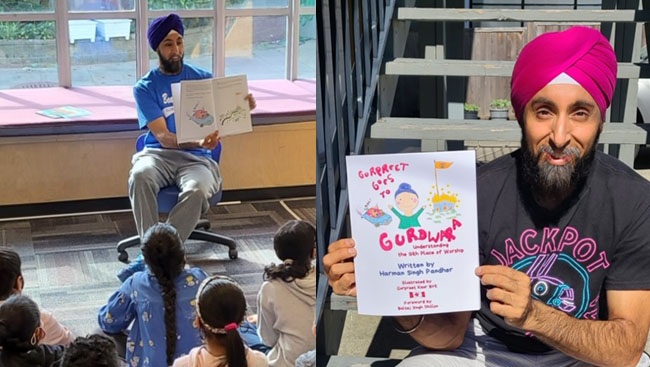“There is the idea of giving kids a mirror, but we also need to provide them with windows of other worlds they don’t know about. As Canadians, we share so much in common. One community’s struggle is everyone’s struggle and our freedoms are interconnected,” says teacher Harman Pandher.
They say that teaching is the profession that teaches all other professions. Surrey school teacher, Harman Pandher, does just that and much more in his classroom. The Burnaby resident was recently recognized for his efforts in the 2021 B.C. Multiculturalism and Anti-Racism Awards for building bridges between communities. Pandher was born in Vancouver and attended the University of British Columbia to become a teacher. With 20 years of experience under his belt, he now not only teaches all subjects to his Grade 5 class at Beaver Creek Elementary, but also teaches Punjabi at his school.
Alongside academics, Pandher’s mission is to promote diversity and multiculturalism to youth. He served on the Board of Directors of the Burnaby Multicultural Society, which, for many years, was the flagship organization for multicultural issues and the creation of cultural awareness. In addition, Pandher went on to co-found two organizations. Through SONG (Seeking Oneness for the Next Generation), a creative mentorship association, Pandher mentors youth by fostering their involvement in the arts. “At its core, SONG is about bringing youth together from diverse backgrounds and using their talent in the community for good causes,” says Pandher.
Pandher then went on to launch SACH (South Asian Community Hub), which is a non-profit community organization providing integrated one-stop services for those impacted by alcohol and substance use, and mental health issues. Promoting the well-being of diverse communities in Surrey and around the province, the organization strives to fight systematic racism by breaking barriers around accessing services for underserved communities with racial barriers. Pandher further explains, “This is not just limited to the South Asian community. We are seeing this model achieve success for First Nations and other cultural communities as well. We just need to be culturally sensitive and speak to people in their language.”

Outside of his work with various organizations, Pandher also writes – but not without cause. His latest project is a children’s picture book, Gurpreet Goes to Gurdwara: Understanding the Sikh Place of Worship, which portrays the story of a young boy who learns more about his religion by a visit to the Gurdwara. Available in elementary schools around the Lower Mainland, Amazon and Chapters Indigo, the book serves as an anti-racist tool by filling the gap of readily available educational resources about minority communities. Pandher’s goal is more than just a good read, “The book is a great medium to reach children. While it covers my experience as a Sikh Canadian, it really is an introduction to Sikh traditions and the Gurdwara. Most importantly, it is a launching pad to conversations.”
Stepping into teacher Pandher’s classroom, such conversations create the essence of his learning environment. Intending to broaden his students’ horizons, Pandher makes a conscious effort to bring in resources that are representative of the students he teaches, so that they get a sense of their identities in the books or videos they watch. “There is the idea of giving kids a mirror, but we also need to provide them with windows of other worlds they don’t know about. As Canadians, we share so much in common. One community’s struggle is everyone’s struggle and our freedoms are interconnected,” Pandher puts eloquently.
Undoubtedly, teachers are not the only influencers in children’s lives; parents have an important role at home. Pressing on the importance of looking at our own biases, Pandher urges parents to question what they share at home with their children, “Little things like discouraging kids from playing with those outside their race are adding to the problem. It doesn’t have to be about racism – that’s just one form of discrimination. Maybe the problem lies in discriminating between boys and girls, known as sexism. We also talk about bullying, which may have homophobic roots, or may be based on class and caste. There is discrimination within the Sikh community, too. Sometimes, we are the victims, but sometimes, we are doing the discriminating.” No community is off the hook and the very basic level, we can help by not being bystanders. Advocacy and activism are powerful stepping stones towards the solution.
In fact, youth are very passionate about becoming part of the solution and partaking in social causes. Pandher mentions that the younger generation are not afraid to speak out on whatever is available as a social platform – be it a volunteer organization or social media. Youth have been at the forefront of supporting the Farmer’s Protest in Punjab. Before that, youth in the South Asian Community supported the Black Lives Matter movement. They’ve even taken to streets to demonstrate things like climate change. “They’re involved and they’re really inspiring and motivating the older generation to also support causes outside of our Gurdwaras. Gurdwaras are now at these demonstrations and fighting Asian hate, Black racism, and racism against First Nations people. It’s great to see Gurdwaras going beyond the walls of Gurdwaras and bringing langar to Downtown Vancouver. After all, Sikh religion is about social justice and fighting for equality,” elaborates Pandher.

According to Pandher, we can take a reactive approach, where we hear about something and then react. However, the harder part is to find out what the root causes are, given that no one is born a racist. Rather, these seeds are planted at some point in one’s life. This is where the need arises to address issues like economic inequalities, resentment, and scapegoating different communities unfairly due to one’s own hardships. Pandher talks about combatting people’s desperation when they face a lack of opportunity, “Governments need to invest in more mental health support, more social service report and education to help people in all communities. Our community is facing a homeless problem, which is not as widely discussed. These are universal problems that governments need to put funding forward for.”
Pandher points out that the education system is also an integral focus and needs to have curriculums that are even more representative to foster cultural inclusion and acceptance. This is essential because the attitudes that children develop in elementary school stay with them. The key lies in being mindful at all times and not just during one-off multicultural celebrations. Pandher shares an interesting perspective, “It’s great to have a Sikh Heritage Month, Asian Heritage Month or Black Awareness Month, but why are we doing it? It’s because we are playing catch up. We have been considered the other – outside the mainstream – when Canada is really one big mosaic. We are all part of the Canadian story. Vaisakhi is just as much a Canadian celebration.” Factually speaking, Punjabi is the fifth-most common language in Canada and second-most common language in British Columbia. It is the most frequently reported immigrant language in Vancouver, Calgary and Edmonton. Evidently, there is a need to shift our thinking.
The good news is that with teachers like Harman Pandher at the forefront, we are right on track towards that mind shift. Pandher’s community involvement is exemplary, and he is a role-model for the educators and even policymakers of our country. Building a more diverse, inclusive world starts right in our homes and classrooms. Pandher’s next book, slated for later this year, will be a children’s picture book about the Golden Temple. With each effort and with every new book, Pandher continues to turn a fresh, new page for our children, our youth.

